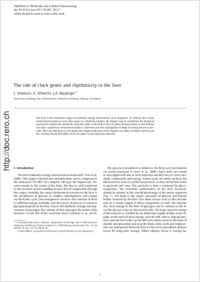The role of clock genes and rhythmicity in the liver
- Schmutz, Isabelle Department of Biology, Unit of Biochemistry, University of Fribourg, Switzerland
- Albrecht, Urs Department of Biology, Unit of Biochemistry, University of Fribourg, Switzerland
- Ripperger, Jürgen A. Department of Biology, Unit of Biochemistry, University of Fribourg, Switzerland
-
2011
Published in:
- Molecular and Cellular Endocrinology. - 2012, vol. 349, no. 1, p. 38-44
English
The liver is the important organ to maintain energy homeostasis of an organism. To achieve this, many biochemical reactions run in this organ in a rhythmic fashion. An elegant way to coordinate the temporal expression of genes for metabolic enzymes relies in the link to the circadian timing system. In this fashion not only a maximum of synchronization is achieved, but also anticipation of daily recurring events is possible. Here we will focus on the input and output pathways of the hepatic circadian oscillator and discuss the recently found flexibility of its circadian transcriptional networks.
- Faculty
- Faculté des sciences et de médecine
- Department
- Département de Biologie
- Language
-
- English
- Classification
- Biological sciences
- License
-
License undefined
- Identifiers
-
- RERO DOC 27202
- DOI 10.1016/j.mce.2011.05.007
- Persistent URL
- https://folia.unifr.ch/unifr/documents/301891
Statistics
Document views: 136
File downloads:
- pdf: 321
